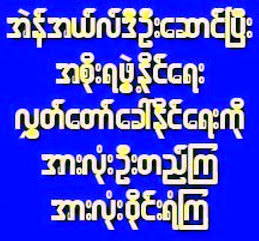RANGOON — A United Nations human rights envoy left Tuesday to inspect the devastation from the cyclone that struck Burma's Irrawaddy river delta three months ago.
Tomas Ojea Quintana, the UN Human Rights Council investigator for Burma, is on a four-day mission to the country and had asked to visit the delta where Cyclone Nargis killed more than 84,000 people.
Burma's military rulers were accused of initially preventing foreign relief workers from accessing the area, then dragging their feet on providing food, water and shelter to the estimated 2.4 million survivors of the May 2-3 storm.
A Western diplomat said Quintana is also expected to visit Rangoon's notorious Insein prison after his return from the delta. The diplomat spoke on condition of anonymity, citing protocol.
Quintana's predecessor, Paulo Sergio Pinheiro, visited the prison in November and met with Burma's longest serving prisoner of conscience—Win Tin, a prominent journalist imprisoned for 19 years—and some detained political activists.
Quintana's visit comes before the 20th anniversary of an uprising against the military junta. The government has already beefed up security, fearing pro-democracy activists could launch anti-junta protests to coincide with August 8, 1988, anniversary.
At the start of his mission on Monday, Quintana met senior members of the State Sangha Organization, the body that supervises the country's Buddhist monasteries and monks. He talked with other religious groups, representatives of a government-sponsored women's organization and the Myanmar Red Cross Society.
Quintana also met the Tripartite Core Group that oversees cyclone relief work. The group comprises representatives of the government, UN agencies and the 10-member Association of Southeast Asian Nations, of which Burma is a member.
Burma has been under military rule since 1962. The current junta came to power in 1988 after crushing a nationwide pro-democracy movement, killing as many as 3,000 people. It called elections in 1990 but refused to honor the results when the party of democracy icon Aung San Suu Kyi won overwhelmingly.
The junta ruled mostly unchallenged until last August, when thousands of Buddhist monks joined rallies against a fuel price increase. The junta cracked down on anti-government demonstrations in September by shooting and arresting protesters, killing as many as 31 people. Dissident groups put the death toll far higher.
UN Rights Envoy Meets Burmese Buddhist Monks
| By THE ASSOCIATED PRESS | Monday, August 4, 2008 |
RANGOON — A United Nations envoy met senior Buddhist monks Monday at the start of a four-day mission in Burma, but it remained unclear if he would hold talks with junta officials and detained opposition leader Aung San Suu Kyi, diplomats said.
Tomas Ojea Quintana, the UN Human Rights Council investigator for Burma, met early Monday with senior members of the State Sangha Organization, the body that supervises the country's monasteries and monks, said Asian diplomats speaking on condition of anonymity because they were not authorized to disclose the envoy's itinerary.
He also met leaders of other religious groups and representatives of a government-sponsored women's group, the diplomats said. They had no details of what was discussed at any of the meetings.
Quintana has also requested talks with senior government officials, representatives of ethnic groups and political parties, according to a UN statement Sunday. The statement did not mention Suu Kyi, the opposition figure under house arrest, but all former UN human rights envoys have asked for such a meeting.
Quintana's predecessor, Paulo Sergio Pinheiro, was not allowed to visit the detained opposition leader when he visited in November.
The diplomats said Quintana was expected to travel to meet government ministers in the capital, Naypyitaw, but it was not known if he would be granted a meeting with junta chief Snr-Gen Than Shwe.
A UN spokesman could not be immediately reached for comment Monday and the UN has not released a full itinerary of Quintana's visit.
He was expected to visit the Irrawaddy delta where a May 2-3 cyclone killed more than 84,000 people. Burma's military rulers were accused of initially preventing foreign relief workers from accessing the area, then dragging their feet on providing food, water and shelter to the estimated 2.4 million survivors.
Quintana was due to meet the Tripartite Core Group that oversees cyclone relief work later Monday, the diplomats said. The group comprises representatives of the government, UN agencies and the 10-member Association of Southeast Asian Nation, Asean, of which Burma is a member.
Quintana's scheduled departure Thursday comes a day before the 20th anniversary of a 1988 uprising against the military junta. The government has already beefed up security, fearing pro-democracy activists could launch anti-junta protests to coincide with the anniversary.
Burma has been under military rule since 1962. The current junta came to power in 1988 after crushing a nationwide pro-democracy movement, killing as many as 3,000 people. It called elections in 1990 but refused to honor the results when Suu Kyi's party won overwhelmingly.
The junta ruled mostly unchallenged until last August when thousands of Buddhist monks joined rallies against a fuel price increase. The junta cracked down on anti-government demonstrations in September by shooting and arresting protesters, killing as many as 31 people. Dissident groups put the death toll far higher.







No comments:
Post a Comment